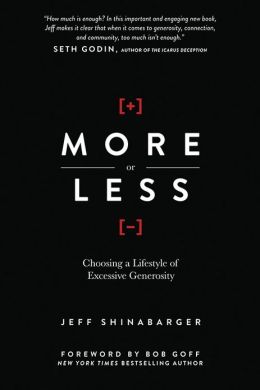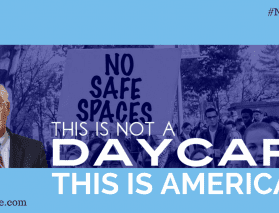 When was the last time you heard someone say that they wanted less?
When was the last time you heard someone say that they wanted less?
I’m guessing that if you live in the US, or anywhere greatly influenced by the consumerism of modern Western culture, it’s been awhile. Hence the need for Jeff Shinabarger’s challenging tome More or Less: Choosing a Lifestyle of Excessive Generosity.
The founder of such efforts as Plywood People and GiftCardGiver.com, co-founder of the Q event, and creative director for Catalyst, Jeff has a history of thinking outside of the box. Plus he lives in Atlanta where I’m headed — so he must be cool.
In More or Less, Jeff challenges us to ask a simple question in every area of our lives: How much is enough?
How Much is Enough?
He challenges us to ask the question across a wide spectrum of life: food, clothing, presents, transportation, time, access, gift cards, and more. He doesn’t propose a one-size-fits-all approach into which all must squeeze, but a broader challenge to rethink our priorities and make life choices based on how much is enough instead of how much more can I get?
Jeff doesn’t just tell, he shares examples from his own life that have stretched him and his family in these areas. I found myself nodding often as I heard his tales of intentionally trying to make food resources stretch for a month — and finding they could go even further than that without making regular grocery store expeditions.
It reminded me a lot of our own story as we have walked by faith for most of the last year and continue to do so. We’ve asked that question, often in different forms: “Do we really need that? What if we can’t do that, will the world end? Let’s try to get by without it and see what happens.” What we found is that we actually need a lot less than we want. Often our question has been how much do we really need to survive? It’s a question much of the world asks. Every day.
By the Numbers
One of the most shocking reveals of More or Less is Jeff’s sharing data about just how wealthy we really are. For example, according to his list (51), when I served as a Christian school administrator, I was among the wealthiest 1% of people in the world based on income! Amazing. Christian school leaders are not highly-paid compared to their secular counterparts. But compared to the rest of the world, they’re kings apparently. Even in our present state of little to no consistent income as we follow God’s call, we’re still in the upper 15%.
I don’t know about you, but such numbers leave me speechless. And wanting to ask how much is enough?
Books on a Plane
To further contextualize my reading of More or Less, I had just watched the new film Mother India, the story of a makeshift orphan “family” thrilled to find a patch of concrete on which to sleep each night. And I was on a plane, flying to Guam to speak at a leadership conference.
While there, I toured the southern half of the island where many of the native Chamarro population live in poverty. I spent a day on nearby Saipan where glitzy resorts sparkle beside shabby, concrete boxes that pass for houses. And I watched a few episodes of those house-hunting shows in which people complain that their $800,000 house just isn’t enough anymore. They want more. One episode showed a house with both his and her master bathrooms. Her bathroom was, in itself, larger than some homes I saw on my journey.
On top of it all, I couldn’t seem to escape that annoying Verizon wireless commercial that claims we each now have the “right” to unlimited wireless access. (If that is my right, how dare they send me a bill for their services each month! But I digress.)
Clearly, some people — let’s just start with me — lose perspective all too easily when it comes to answering this question: how much is enough?
Why Community Matters
So how do we get and keep a healthy perspective in a culture consumed with the pursuit of more? Shinabarger says the answer lies in what I believe to be a powerful word — community:
I believe the purest way to engage the question of more or less is in community. When we open up the conversation and allow others to make decisions with us, the results are greater than something we can come up with on our own. This process of gathering feedback through community is not easy, but the results are good. When you make large purchases, have a conversation with a friend about whether you need it, or whether you just want it. When you choose to volunteer on a project, share what you’re doing with others to make sure the opportunity lines up with your passions and strength. When you evaluate how you live and what is enough, invite the people closest to you to work it out with you. We all have different stories that can make each other’s future story better. The more we integrate the question of enough into the ethos of our communities, the greater our communities will become. (247)
The practical action steps Shinabarger proposes in More or Less: Choosing a Lifestyle of Excessive Generosity intertwine with this call for intentional community. As a fastidious gardener, his sharing of his yard as a community garden space may have stretched me the most! But by sharing our journey with others, we open ourselves to essential accountability, break out of our selfish silos, and position ourselves for greater influence as we challenge all to ask the question: how much is enough?
Where in your life have you learned to ask how much is enough? Do you have a community that helps you process that question? Share your story with a comment so we can all grow our faith together.











